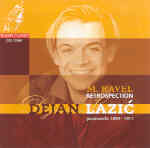This disc contains some of the most boorish, vulgar, mannered, grotesque, self-serving, and pretentious Ravel playing known to mankind. Dejan Lazic takes the jewel-like Haydn Menuet on a flippant joyride, speeding up and slamming down the brakes with depraved indifference to its subtle voice-leading and delicate character. He begins the Pavane with cloying, fake Glenn Gould staccatos in the accompaniment, mauls the basic tempo hither and yon, and exaggerates dynamics to the point where the musical line is deader than the infante défunte. Likewise, the Sonatine’s first two movements suffer from extreme rhythmic fidgeting, although the pianist exerts a little more self-control in the Animé.
Then there’s Lazic’s determindely perverse romp through Le Tombeau de Couperin: his speedy fingerwork in the Prélude causes the notes to collide into each other, and the pianist’s mincing, italicized phrasing in the Forlane and Rigaudon manages the impossible, which is to make these movements sound cheap. Lazic takes the Toccata at such a rapid clip that he’s forced to make frequent pit stops to regroup his hands. With all the interpretive graffiti Lazic playfully spraypaints across the Valse Nobles et sentimentales, I have to acknowledge the beautiful, nuanced sounds he draws from his instrument. Still, Lazic’s arbitrary speed-ups and slow-downs in the seventh waltz destroy the cumulative sweep Ravel intends by his specific “augmentez peu à peu” directive, and Lazic rarely plays No. 6’s triplet meter as written, frequently rushing the second quarter note. Hear, by contrast, how Arthur Rubinstein or Angela Hewitt bring metric flexibility to this movement without losing the feeling of three beats to a measure.
As it turns out, the shortest works fare best. The Chabrier tribute is gorgeously colored and the Borodine pastiche is delightfully brisk. Lazic begins and ends the recital with two distinctly different interpretations of the little 1913 Prélude: the first played absolutely straight, and then in “free tempo” the second time around. Surprisingly (or perhaps not) the first version sounds shapelier and more melodically coherent. It all boils down to five minutes of absorbing music making and 58 minutes of party record from a pianist who’s too talented to continue getting in his own way.
































